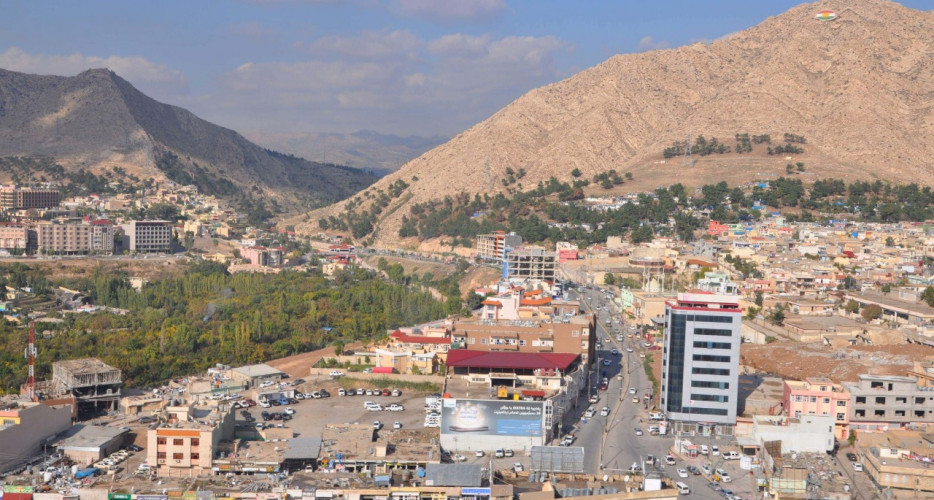
PEREGRAF
Freedom of expression is under attack in Duhok governorate, with any critical comment about the government or the locally-dominant Kurdistan Democratic Party (KDP) liable to bring attention from the security forces, leaving many people unable to voice their dissatisfaction about the state of the economy.
“We do not even dare protest,” Shvan Mohammed, a 20-year-old from the governorate, told PEREGRAF.
“If they know that I have mentioned the party and the government, they will accuse me and I will be summoned by the Asayish," he added.
Mohammed said that he is wary of criticizing the authorities because of the arrests that took place in the governorate last year, but said he cannot deny what he has seen and experienced.
He quit his final year of high school because he had to earn money for himself and his family, working a job that paid $9 per day. The unreliability of public services, like electricity and water, also weigh heavily on him. Many of his friends are unable to find work.
“There are too many problems,” he said.
“The young people of Duhok suffer from unemployment and lack of money, but we do not know where to turn.”
One demonstration in Zakho on August 19 led to the detention of dozens of people.
The protest occurred in response to the government’s decision to allow Turkish truckers into the Kurdistan Region, undercutting the livelihoods of local drivers. The gathering quickly descended into chaos with gunshots and scuffles that injured both civilians and members of the security forces.
Dozens of journalists, activists, and citizens were arrested in the days after, each on charges of “endangering security and rioting." Five activists and journalists from the governorate who were arrested later that autumn went on trial in mid-February and were each sentenced to six-years in prison.
“No media outlet has been able to convey the message of the people of Duhok in terms of freedom and lack of services. Even art and culture cannot reach public opinion," Zeravan Bargarai, a journalist in Badinan, told PEREGRAF.
"Day by day, the pressure of the ruling party increases in various ways to further undermine Duhok with the aim of silencing of activists and journalists," he said.
"Unfortunately, other parties are aware of this situation and have chosen to remain silent.”
Badinan is a stronghold for the KDP, with the Patriotic Union of Kurdistan (PUK) and the Kurdistan Islamic Union (KIU) acting as weak rivals.
"The pressures [on people] from the ruling party are on the rise," Bayar Amedi, a civil activist in Duhok, told PEREGRAF.
"Any activist or journalist working outside the government will cause many problems for themselves. Even on social media, they cannot criticize and share news about the people’s misery.”
According to PEREGRAF’s investigations, Duhok government suffers relatively more than other areas in the Kurdistan Region, hosting large numbers of displaced persons and with large numbers of residents trying to emigrate.
Compared with Sulaymaniyah and Erbil, there is little infrastructure investment in Duhok.
"They were supposed to build an airport, but the money was spent [on other things]," Haji Murad, 60, told PEREGRAF.
"There is a lot of injustice and a crisis has intensified in Duhok," he said. "Now the unemployment rate has increased. There are people who kill themselves daily. There are many young women and men who have emigrated.”
The KDP holds all of the important positions in the governorate and makes many important decisions internally.
"What the authorities do to journalists and activists in Badinan make people distrust the judiciary and so the media cannot do its job conveying the suffering of citizens or being the voice of protest from the people of Duhok,” Murad said.
Deputy Governor of Duhok Majd Said Salih disputed this view.
"What is said, that Duhok has been neglected by the regional government in terms of services, is not true, but it is not at the level of what the governor or the people’s administration want to see," Salih told PEREGRAF.
He argued that the reason for the rise in poverty in the governorate was the presence of larger relative numbers of refugees and internally displaced persons compared with other parts of the Region, which has made the area’s suffering twice as great.
Salih pointed to budget allocations for more than 200 infrastructure projects, including agricultural and industrial zones, as an achievement. He added that the airport project was not canceled, but that work is merely suspended because of the financial crisis.
The deputy governor also rejected the idea that freedom of the press was being restricted in Duhok.
“These journalists and activists have been treated according to the law and the government is responsible for protecting the security of the people. What is said is not true, that there is no freedom in Badinan."